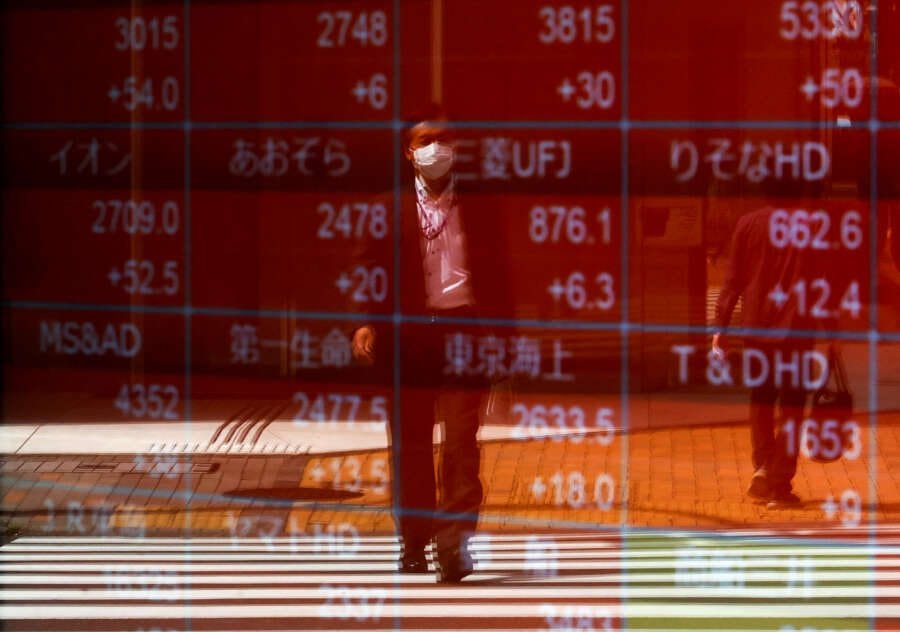
LONDON (Reuters) – World stocks fell for a third straight day on Thursday, as strong U.S. jobs data bolstered bets on another U.S. interest rate hike this month and tit-for-tat trade salvoes between China and the United States also dampened sentiment.
Traders watched the traditional driver of global borrowing costs, the 10-year U.S. Treasury yield, climb to a fresh four-month high [GVD/EUR] as the weekly ADP report on private sector hiring and firing came in stronger than expected.
There were plenty more boundaries being tested too ahead of what looked set to be a lower start on Wall Street shortly. [.N]
The global stocks selloff also included a crunching 2.9% drop and near three-month low for Europe’s travel and leisure stocks – a clear side-effect of recession angst – while Wall Street bank Citi’s latest investor poll showed China was the new consensus sell.
Analysts at Rabobank pointed out too that the U.S. yield curve has now been “inverted” for a full 12 months. Inversions are a traditional recessionary warning signal and parts of this one have been the most extreme since the 1980s.
The strong U.S. jobs numbers, combined with hawkish Fed minutes on Wednesday, hoisted 2-year Treasury yields above 5% for the first since early March when turmoil hit the U.S. banking sector and sent investors scrambling for safety. [GVD/EUR][US/]
The 10-year Treasury yield was on the cusp of 4% again and Germany’s 10-year Bund, the benchmark for the euro zone, was up near the top of its recent range too, at 2.58%.
The lagged effects of interest rate moves made it incredibly difficult for central banks like the Fed to now judge whether they had done enough, too much or not enough, said Peter Spiller, the chief investment officer of CG Asset Management.
“The chances of them getting it exactly right? History is not encouraging,” Spiller said.
“The word I like to use is fragile,” he added, referring to the global economic outlook. “At this level it really is very fragile.”
CHIPPING AWAY
The latest flare-up of tension between the United States, Europe and China had also hit the mood.
U.S. Treasury Secretary Janet Yellen was kicking off a trip to China just days after Beijing slapped export curbs on some key metals used in microchips and also signalled the move may be “just a start”.
The Hang Seng index in Hong Kong, where many of the big Chinese firms are listed, tumbled more than 3% overnight and Japan’s Nikkei fell 1.7%, having recently hit a 33-year high.
“Sentiment has soured for equity bulls as Sino-U.S. relations take another step backwards and investors adjusted to the fact that the Fed remains more hawkish than hoped,” said Matt Simpson, a market analyst at City Index.
“The Fed’s decision to pause (rate hikes) was not actually unanimous and most members are up for further hikes,” he added, referring to the meeting minutes the U.S. Fed published on Wednesday.
While almost all Fed officials agreed to hold interest rates steady last month, the minutes shown the vast majority expected further increases eventually. Money market traders now see an 85% chance of a quarter-point hike at the bank’s next meeting on July 26, and about a 50/50 chance of another by November.
VALUE POINT
U.S. E-mini stock futures pointed to a 0.6% lower restart for the S&P 500, following its drop of 0.2% on Wednesday. [.N]
In the commodity markets, Brent crude futures bounced 40 cents, or 0.5%, to $77 a barrel. That was within its range of $72 to $78 for the last couple of months as demand concerns have been balanced by Saudi Arabia and Russia cutting output. [O/R]
The U.S. dollar index – a measure against the world’s other top six currencies – was also trickling lower. [FRX/]
Japan’s beaten-up yen was driving the move. Its biggest rise in almost a month took it to 143.9 to the dollar and followed almost daily warnings from Japanese officials about the currency’s recent weakness.
CG Asset Management’s Spiller said the yen, in terms of purchasing power parity, was now a staggering 50% out of line after its fall this year. “The value point is so powerful here that I am prepared to own yen,” he said.
(Reporting by Marc Jones; Editing by Clarence Fernandez and Hugh Lawson)


